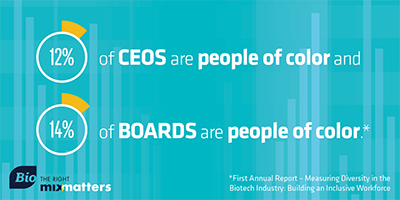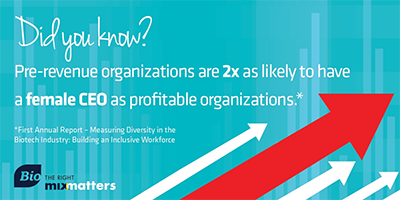The “Right Mix Matters” campaign was launched to provide specific tools to accelerate gender, racial, ethnic and LGBTQ representation on biotech company boards, in C-suites and in functional leadership positions.
Learn more at BIO.org/Right-Mix-Matters

For the first time ever, BIO took a comprehensive look at the state of diversity and inclusion in the biotech industry. The findings are in a newly released report, “Measuring Diversity in the Biotech Industry: Building an Inclusive Workforce.”
Although the report found significant commitment to diversity and inclusion, the bottom line is that we are not there yet. That’s for sure. The report analyzes data from a survey of nearly 100 BIO member companies, conducted online from May to June 2019. The findings show that while responding companies are approaching gender parity, with 45% female employees overall, this near balance shrinks at the higher levels – with 30% female executives and 18% female board members. Representation of people of color is slightly lower, at 32% overall. Again, this number lessens at the higher levels – 15% of executives and 14% of board members are people of color.
Among the companies that responded to the survey, 80% reported that their employees demonstrate a commitment to creating an inclusive environment, while 73% reported that their leaders show this same commitment. In addition, nearly half said that diversity and inclusion is one of their organization’s stated values or priorities.
One interesting takeaway from the report is the fact that the findings show pre-revenue, smaller, and private companies are making greater strides in increasing representation than their profitable, larger and publicly-held counterparts.
For example, pre-revenue organizations are more likely than profitable organizations to have people of color make up one-quarter of their executive level workforce – and are also more likely to have a female CEO. In addition, small organizations are more likely to have a female CEO, while privately held organizations are more likely to have a person of color as CEO. The reasons behind these specific findings are not clear.
As is the case in many other industries, BIO companies are at the beginning stages of their efforts to increase diversity and inclusion. Programs on accountability and harassment or bias do exist in most organizations (82%), yet trainings and official D&I programming only exist at 52% of organizations. And, only 16% of companies have goals to promote or develop women and 12% of companies have goals to promote or develop people of color. In addition, 41% of organizations do not collect common diversity data such as employee demographics or discrepancies in performance rankings, pay and promotion.
BIO is committed to helping its member organizations implement the right programs and the right tools to achieve the right mix in their workforce. BIO has developed several resources — such as BIO’s Diversity and Inclusion toolkit and the BIO Boardlist — that are available at RightMixMatters.org. These resources aim to help our member companies achieve their diversity and inclusion goals, and can be particularly helpful for smaller companies that lack adequate staffing or resources to dedicate to diversity and inclusion efforts.
The report’s recommendations implore companies to start by assessing where they are when it comes to diversity and inclusion. From there, companies can expand the collection and tracking of data on representation, and implement such diversity and inclusion programs as leadership development and inclusive behavior trainings, investment in pay equity, networking opportunities, reviewing hiring/career progress practices and more. In addition, the report recommends that companies pay particular attention to representation at the board level.
Creating workforces with the right mix of experience, perspectives and backgrounds has never mattered more for BIO’s member companies. Our companies need perspectives and backgrounds that are as diverse as the clinicians and patients we’re trying to reach.
As this report shows, BIO member companies understand that diversity and inclusion are good business and good for patients. BIO looks forward to working together to help build and sustain workforces with the right mix across the biotech industry.
Source: https://www.bio.org/blogs/bios-new-annual-report-finds-work-needed-improve-di-biotech-industry


